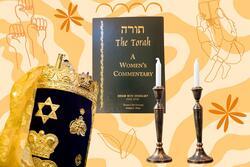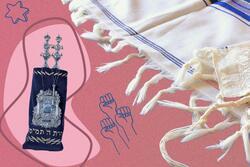The First Time I Studied Gemara, I Learned About Inclusivity
Learning halakha (Jewish law) is always a game of roulette when you’re not an able-bodied cisgender heterosexual man with the “correct” genealogical status (not a patrilineal Jew, not a child of a forbidden relationship, etc.). Jewish law, like the Talmud, tends to discuss women and disabled people bluntly and dismissively, which I often find distressing and difficult to learn. But sometimes there are also nice moments of inclusivity that add a new depth to ritual for me.
For the Jewish month of Adar Aleph this year, I took it upon myself to take part in a program from Hadran, which is an organization dedicated to advancing women’s Talmud study. The program was their #MegillahChallenge, wherein participants learn the 31 pages of Masechet Megillah in 31 days. In certain Jewish communities, such as the traditional Orthodox community I’ve lived in my whole life, women do not learn Gemara.
Growing up, I knew in theory that women who learned Gemara existed, but I certainly didn’t know any. During my middle school years, I begged my school to teach me Talmud, but that door was shut to me. When I switched schools for high school four years ago, I pushed to be in a text-based Gemara class, even though I would be behind everyone else.
Before I participated in the #MegillahChallenge this past month, I’d never learned an entire book of Gemara before, much less outside of school. By Purim, I had finished the whole book. I felt so accomplished and empowered having achieved something I, even mere months ago, would not have thought possible for myself.
One topic I studied while learning Mesechet Megillah (the book of Gemara that discusses laws and ideas related to Purim) was a discussion of who cannot read the Book of Esther for other people. As I began the section, I thought I knew exactly where this was going. It would list a bunch of different types of people, discredit their intelligence or cognitive abilities, and that would be that—open and shut. But that’s not what happened.
There are three types of people who are initially said to not be allowed: minors, “imbeciles,” and deaf people. For the former two, there seem to be clear reasons. People below bar/bat mitzvah age (13 and 12, respectively) are not obligated in any commandments. The second category, while ableist according to our modern sensibilities, exempts people who were unable to read. Some of the rabbis explain that the reason a deaf person cannot fulfill the commandment of chanting the Book of Esther for others to hear because they cannot hear it themselves. But others disagree, saying that if the words are in your heart, it does not matter if the blessing is inaudible.
These rabbis bring up the example of the Shema. The word “shema” itself means “hear,” lending itself to the first explanation of how to fulfill the commandments of blessings. However, the Gemara argues that you only need to have the words in your heart. And, since deaf people can fulfill the obligation of Shema without literally hearing it, they can also fulfill the obligation of reading the Megillah.
The Gemara’s arguments against deaf people being able to fulfill the mitzvah makes it clear that the only reason is the logistical issue of not being able to hear. Even if this were the final ruling at the time, today’s access to technology like cochlear implants and sign languages like ASL would call for a reevaluation of this status.
Learning this section, I was pleasantly surprised by how persistent the rabbis were in relitigating the issue. The amount of page time devoted to questioning a ruling that diminishes the status of deaf people represented, to me, that these rabbis recognized that physical limitations should not be a barrier that keeps people from following the mitzvot.
Additionally, the idea that prayers and blessings only need to be within your heart grants more freedom to people praying in general. If simply reading the words doesn’t work for you for whatever reason, you can fulfill the mitzvah by holding what you want to say within your heart. This idea makes prayer accessible to so many more people.
Accessibility is fundamental to making progress within our communities. If disabled people are kept from reading the Book of Esther or women are kept from learning Gemara, it is a fundamental failing of our Jewish institutions. Telling someone with a love for Jewish rituals and learning that there’s not a space for them to do those things will inevitably push them not only from those things, but away from Judaism entirely.
My learning of Megillah was made possible by Hadran, which makes Gemara learning accessible to people of all genders at almost any level of experience. Because of this opportunity, I feel like my connection to Judaism has deepened. And as I become a Jewish leader, it is important to me that I work to make our community more inclusive and lift up rabbinic precedence for inclusion.
I can only imagine that including disabled people to be a part of rituals and mitzvot would help them feel connected to their heritage and their community. Making spaces and rituals accommodating to all different types of people will ensure everyone, regardless of their identities and disabilities, knows that they belong in the Jewish community.
This piece was written as part of JWA’s Rising Voices Fellowship.







